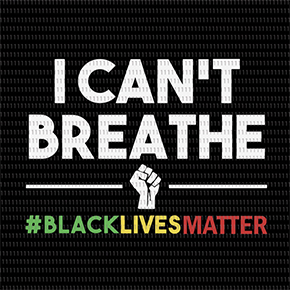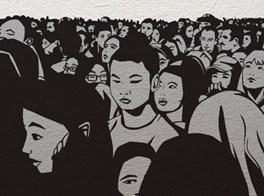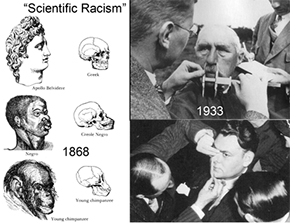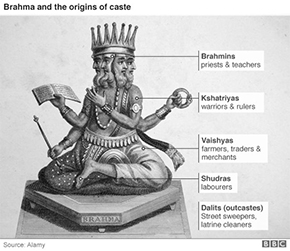| |
|
|
Opinion Piece on
The Antidote of Racism in Islamic Perspective
By Asif Tanveer Awan Advocate, Research Associate,
MUSLIM Institute
|
|






|
|
One would think that the currently trending slogan "I can't breathe" viral across social media in these trying times would be referring to the pandemic. It is rather almost unreal to imagine that this slogan is actually a mantra of the anti-racism "black lives matter" protests across the world. The basic tenet of a society that 'all human beings are born free and equal in dignity and rights' is yet to be fully practised in most societies around the world.
 A significant portion of general population to this day, including many leaders, stubbornly believe that humans can be categorised into superior and inferior based on their physical appearance, behavioural traits, and socio-cultural and ethnoreligious identities. Although discrimination can be found in several parts of the world in one form or the other, western societies are particularly suffering from this menace despite being the ones to successfully incorporate multiculturalism in many metropolises. Though good number of western social scientists, thinkers, philosophers, and humanists have been trying to eradicate the menace of racism and its subordinate evils such as xenophobia, otherness and supremacism from their social consciousness since centuries through several means, however, they have yet to clean the social fabric from this filth. The recent revolutionary wave of anti-racism protests in the world especially observed in the United States of America after the brutal extra-judicial killing of George Floyd, an African-American, has depicted this unfortunate reality.
A significant portion of general population to this day, including many leaders, stubbornly believe that humans can be categorised into superior and inferior based on their physical appearance, behavioural traits, and socio-cultural and ethnoreligious identities. Although discrimination can be found in several parts of the world in one form or the other, western societies are particularly suffering from this menace despite being the ones to successfully incorporate multiculturalism in many metropolises. Though good number of western social scientists, thinkers, philosophers, and humanists have been trying to eradicate the menace of racism and its subordinate evils such as xenophobia, otherness and supremacism from their social consciousness since centuries through several means, however, they have yet to clean the social fabric from this filth. The recent revolutionary wave of anti-racism protests in the world especially observed in the United States of America after the brutal extra-judicial killing of George Floyd, an African-American, has depicted this unfortunate reality.

The MUSLIM Debate, via themuslimdebate.com
In the modern world, when on one hand scholars are discussing the ideas like global village and multiculturalism, on the other, we are witnessing mass protests against racial discrimination – especially when it comes to law enforcement – in developed countries such as the US and UK among other nations. The Washington Post reported that even though unarmed police shootings in the US have declined in the past couple of years, unarmed black people are still disproportionately being killed by the police at a higher rate than unarmed white people. This brings us to think about the social formation and governing norms of societies that can well describe the underlying realities. Indubitably, the modern western social system is a product of western imperialism, colonialism, militarism, and materialism of almost last four centuries. Materialistic economic objectives of the western societies gave birth to discriminatory policies such as Mercantilism and Capitalism. Racism, as we recognise it today, originated with the enslavement of Africans in the early 16th century. James Walvin, winner of the 1975 Martin Luther King Memorial Prize, explains in his book Black and White: The Negro and English Society:
"the British don't become slave traders and slavers because they are racist; they became racist because they use slaves for great profit in the Americas and devise a set of attitudes towards black people that justifies what they've done. The real engine behind the slave system is economics."

The Pseudo-scientific racism, via sahistory.org.za
In a well-orchestrated policy, pseudo-scientific theories were misused to support and promote the belief of 'superior' and 'inferior' human races among European and American populace in the early 19th century. Toxic territorial nationalism, widely inspired by racism, led towards two world wars and several genocides. In the early 19th century, almost all of the pre-war European nations believed in their cultural, economic, and military supremacy. A renowned American historian, Lawrence Rosenthal, wrote in his book "The New Nationalism and the First World War" about the western race-based toxic territorial nationalism as:
"A new and aggressive nationalism, different from its predecessors, emerged in Europe at the end of the 19th century… The new nationalism engaged the fierce us/them group emotions – loyalty inwards, aggression outwards – that characterise human relations at simpler sociological levels, like the family or the tribe. What was new was attaching these passions to the nation… In its outward-looking dimension, the new nationalism was fully a movement of the 'age of imperialism' – of the 'great game', the 'scramble for Africa', the enterprise of great powers."
One of the great Muslim philosophers of the 20th century, Allama Muhammad Iqbal, in a poem titled 'Tulu-e-Islam', indeed pointed out the racial fault lines in the western social fabric in the following words:
|
|
The discrimination between master and slave is a violation of humanity,
Beware, O the tyrants, the punishment by Nature is severe;
&
So far, man is an abject victim of imperialism,
How horrible, man is hunting man!
(Bang-e-Dara)
|
|
|
Although various fundamental rights are legally promised to the minorities in the US and Europe, the social attitude of the whites towards the non-whites is still a significant challenge for the western communities. Systemic racism is an undeniable proof of it. Nonetheless, we should also give credit where credit is due. Efforts and work on multiculturalism in the West are steps in the right direction whereby multicultural hubs like New York, Toronto, London, and Berlin are symbols of mutual respect between people of different faiths, religions, races, and cultures. Therefore, we ought to learn from these steps in the ‘right’ direction, and use it for solutions to the increasing menace of racism.
Sadly, however, racism and discrimination is not only limited to the West. Muslims too, are guilty of it. When it comes to the Muslim world, the approach towards discrimination and racism differs when we move from theory to practice. Muslims in South Asia – most of whom converted from Hinduism – still unfortunately believe in the caste-based system. This inherently racist and discriminatory concept is still unfortunately prominent in countries like India, Bangladesh and Pakistan whereby people belonging to a particular caste or tribe regard themselves as superior to the others.
Similarly, in the Middle East for instance, the superiority complex and conflict between ‘Arab’ and ‘Iranians’ is essentially also very mindless. Being an ‘Arab’ in itself is a huge honour. While the language, culture and history is so significant, however, one cannot simply claim superiority on this basis as that is in itself ignorant and against Islam’s teachings. Likewise, being an ‘Iranian’ is a great deal and honour in itself. You belong to one of the world’s oldest civilisations, you belong to one of the world’s most beautiful areas, you speak one of the world’s most sweetest languages, but, all this does not give you the right to claim yourself to be superior or better than any other culture or race. Doing this serves as a testament of dull-wittedness rather than superiority.

Caste system in india, via bbc.com
Outside of the Muslim world, we see similar behaviour of self-proclamation of superiority over other races and cultures. Chinese Han supremacy is another key example of this menace. In India, people are discriminated based upon their race and religious views in a hierarchal caste-based manner. Existence of caste's classification (Brahmins, Kshatriyas, Vaisyas, Sudras, Pariahs) on the social level is a horrible system in the present world. Dalit community is one of the racial classes in India that have been facing systematic oppressions, and even US anti-racial protests have triggered once again the Dalit community to call for an end to their discrimination.
History is evident that one of the prime issues faced by a sensitive faction of society is how to curtail racial prejudice and discrimination. Different ideas and notions have been applied to end this menace at different times. Such kinds of social issues are well addressed by Islam centuries ago. Islam victoriously eradicated racism and completely denied racial pride and gave practical lessons for human equality. The Holy Quran categorically rejects the idea of racism and promotes human equality;
|
|
"O mankind! We have indeed created you from one man and one woman, and have made you into various nations and tribes so that you may know one another; indeed the more honourable among you, in the sight of Allah, is one who is more pious among you; indeed Allah is All-Knowing, All-Aware. (Piety is the basis of honour in Allah's sight)."
(Al-Hujrat, 13)
|
|
|
Similarly, Exalted Prophet Muhammad (ﷺ) has also promoted human equality in his sermons and practices. In his last sermon, Holy Prophet (ﷺ) vehemently rejected this menace in the following words:
|
|
"All mankind is from Adam and Eve, an Arab has no superiority over a non-Arab nor a non-Arab has any superiority over an Arab; also a white has no superiority over black nor a black has any superiority over white except by piety (taqwa) and good action."
(Sahih al-Bukhari)
|
|
|
Islam gave the concept of equality among humans as an actual source to curb racial discrimination. Interestingly, this is not only a set of ideas but also the practical examples set by Exalted Prophet Muhammad (ﷺ) which are unmatchable even after around one and half millennia.
The prestigious prominent position of honourable Bilal ibn Rabah, a former African slave from Habasha, in Islam is one of the prime evidence of human racial equality and pluralism of Islamic society. Honourable Bilal was born in 680 CE in Mecca to slave parents - Rabah and Hamamah. He served as a slave to an arch enemy of Islam - Umayyah ibn Khalaf. Despite brutal torture by Umayyah, honourable Bilal not only converted to Islam but also remained steadfast in his faith. Hearing about his tribulations and sufferings, Exalted Prophet (ﷺ) sent honourable Abu Bakr Siddique, who not only bought him but also freed him. Hence, freedom was the first gift bestowed to honourable Bilal ibn Rabah by Islam. In addition to that, later on, the second Caliph of Islam, honourable Umar Farooq, gave him the title, Sayyedna (our leader). Soon, honourable Bilal became one of the closest and most trusted companions of Exalted Prophet Muhammad (ﷺ). He was also honoured to be selected by the Exalted Prophet (ﷺ) to be the first Muezzin (a man who calls Muslims to prayer from the minaret of a mosque) of Islam. On the historical event of the conquest of Mecca, Exalted Prophet Muhammad (ﷺ) called on honourable Bilal ibn Rabah to give the first call for prayer by climbing up the roof of Kaaba (the most sacred place of Islam) in the presence of a large number of Muslim and non-Muslim nobles. This particular event decisively rooted the concept of human equality in the social fabric of Islamic society. During the times when black slaves were looked down upon, the Exalted Prophet Muhammad (ﷺ) sat together with honourable Bilal on the dining sheet and negated the racist bigotry and set a practical example for the Ummah. This was the most significant and universal revolution against racial discrimination.
He (ﷺ) refuted the supremacy of humans over other humans based upon biological or linguistic discrimination. There are several other Hadiths (sayings) of Prophet Muhammad (ﷺ) negating racism in society.
|
|
The Prophet (ﷺ) said, "None of you will have faith till he wishes for his (Muslim) brother what he likes for himself."
(Sahih al-Bukhari)
|
In another Hadith, Exalted Prophet (ﷺ) says: "I advise you (in my will) to fear Allah, accept the commands of your leader and follow him even if he is a black slave."
(Sunan Ibn Majah)
|
|
|
The story of another companion of Exalted Prophet (ﷺ), honourable Julaybib, is an essential example of the importance of human equality and pluralism in Islam and the life of Prophet Muhammad (ﷺ). Honourable Julaybib was a black slave, bearing dwarf-like stature and often described as 'damim' which means ugly and deformed. He was ridiculed and shunned in that society. Racism thus very evident in that society before the arrival of Islam. However, in a society developed under the guidance of Exalted Prophet (ﷺ), honourable Julaybib was treated as an equal human being. Even, astonishingly, Exalted Prophet (ﷺ) went to an Ansar and asked him to marry his daughter with honourable Julaybib. Although the Ansar and his wife were hesitating about this relationship, their daughter happily accepted this marriage proposal as it was directly suggested by Exalted Prophet (ﷺ). Moreover, honourable Julaybib was martyred when he was in an expedition with Exalted Prophet (ﷺ). He (ﷺ) asked his companions, "Have you lost anyone?" his (ﷺ) companions named their relatives and friends who were martyred. He (ﷺ) again asked the same question to other companions who also named their relatives and friends. Another group of his (ﷺ) companions told that they had not lost any close relative upon which Exalted Prophet (ﷺ) said, "But I have lost Julaybib, search for him in the battlefield." When he was found, Exalted Prophet (ﷺ) went to the spot where Julaybib was laying and said, "He killed seven and then was killed. This (man) is of me and I am of him." (Musnad Ahmad ibn Hanbal)
The concept of Iqbal's True Believer (perfect human) is also important to understand the role of an individual in a society based on the fundamental principles of Islam. According to Iqbal, a True Believer harmonises himself with divine moral values and attributes. The disinterested humanitarianism and universality of Iqbal's True Believer overrun the barriers of race, colour and geography. He says in his famous poem, Rumuz-e-Bekhudi, in the explanation of this verse of Surah-e-Ikhlas of Holy Quran, "He begat not, neither was He begotten,"
|
Loftier than hue and blood thy people are,
And greater worth one Negro of the Faith
Than are a hundred redskin infidels.
A single drop of water Qanbar took
For his ablutions is more precious far
Than all the blood of Caesar. Take no count
Of father, mother, uncle; call thy self
An offspring of Islam, as Salman did.
(Rumuz-e-Bekhudi)
|
|
|
Moreover, Iqbal considered the division of humans on the basis of race and colour as a treacherous assault on one's fort (of unity). As a remedial measure, he presented his universal concept of 'unity of man,' which was taken from the Quranic concept of Monotheism (Ahad). In his famous poem, 'Mecca and Geneva', he says:
|
The Western diplomacy aims at dividing nations;
Whereas Islam aims at only creating a community of human.
Mecca has given Geneva this message:
A League of human or a League of Nations?
(Zarb-e-Kaleem)
|
|
|
In the poem, "Khulasa Mutalib-e-Masnvi - Dar Tafseer Surah-e-Ikhlas," he advised that the 'universal unity of men' can be achieved by following the attributes of God, Ahad (One). He says:
|
|
A hundred nations thou hast raised from one,
On thy own fort made treacherous assault.
Be one; make visible thy Unity;
Let action turn the unseen into seen;
(Rumuz-e-Bekhudi)
|
|
|
The prime message that we take from the teachings and life of Exalted Prophet Muhammad (ﷺ) is that humanity is based upon human dignity and respect. The inner-self or 'soul' has to be cleaned for superiority in the spiritual world. As soon as one realises the spiritual status of man, one becomes humble and respects other humans. This is the sole message that needs implementation today. Until and unless a human being is not given due respect and honour, no one can eradicate racial discrimination and oppression from society.

FRA, via fra.europa.eu
In the present challenges, all multicultural societies can move towards peace without ethnic and racial discrimination by following the life of the Prophet Muhammad (ﷺ). In the modern era, the survival of nations and possible solution of racism and hate against humans because of their skin and colour could be curbed by practising the Prophet Muhammad's (ﷺ) life. In short, the underlying reality of life has to be considered more than mere material in its origin and respected more than the colour of skin.
|
| |
|
|
|
|
|
| |
|